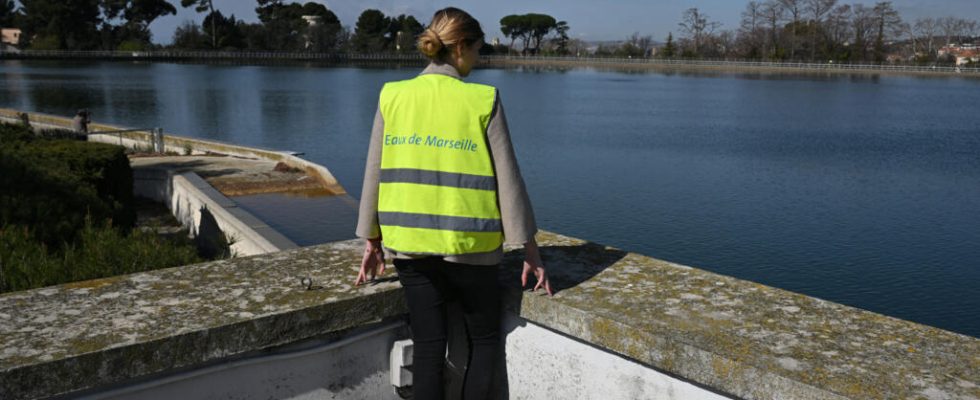On the occasion of World Water Day, the French government on Friday provided a progress update on its water plan presented in 2023. While climate change is making this vital resource rarer on the planet – including in France – around fifty factories in France have committed to reducing their consumption by 10% before 2030.
3 mins
As global warming makes access to scarce water more difficult, consumption is increasing globally. In front of this situation, French President Emmanuel Macron presented his water plan in March 2023.
This Friday, March 22, World Water Day, was an opportunity for the government to take stock. “ 51 industrial sites » are concerned, explained the Minister of Ecological Transition Christophe Béchu, who came to promote this plan on the channel France 2 : “ They represent 25% of the water consumption of all French industry and have committed to reducing their water consumption by more than 10% before 2030. », continued the minister.
Industry takes 8% of all water in France
In this list, we mainly find agri-food manufacturers – such as a Danone factory or a Coca Cola factory – and chemicals, but also a site of the steel giant Arcelor Mittal.
Industry takes almost 8% of the water used in France. The government assures that it has chosen sites with a strong potential to reduce their water consumption. But the chosen method is not binding: manufacturers will not be penalized if they do not meet their objectives.
Read alsoEnvironment: water in France massively contaminated by chlorothalonil metabolites
For the NGO Oxfam France, the government’s water plan should have been legally binding to move faster in reducing water consumption and is not ” not enough »ambitious, believes Quentin Ghesquière, climate and agriculture campaign manager for the association. “ This is less than the objective set during the water conference in 2019, under Emmanuel Macron’s first mandate. At the time, the objective of reducing water withdrawals was set at 10% over 5 years for all sectors, and at 25% over 15 years. So the objective of reducing water use [tous secteurs confondus] was revised downwards », he points out.
Read alsoWater crises threaten world peace
Agriculture “ spared » by water saving constraints?
The association also regrets that the initiative has not been extended to other economic sectors, or not enough. “ We have assessed that only five measures of the water plan concern exclusively agriculture and they are far from sufficientbelieves Quentin Ghesquière. In addition, the Ministry of Agriculture seeks to spare the sector even though it is the one that consumes the most water. »
Agriculture represents 58% of water consumption in France. However, forcing agricultural businesses to reduce irrigation – whether of corn fields or other water-intensive crops – is a sensitive subject. Especially when the anger of the farmers has not completely subsided.
Farmers, many of whom demonstrated in January and February, feel overwhelmed by European environmental rules. This while many do not earn enough, notably sheep and goat breeders, or even arborists. Three months before the European elections, the chances that the government will change its position and ask more from farmers to save water are almost zero.
The Minister of Ecological Transition again defended mega basins on Friday March 22, these large water reservoirs contested by environmentalists, some of which were deemed illegal. Christophe Béchu contests the term “ mega-basins » but said he was in favor of installing new tanks of this type.
Water management at the heart of a controversy over the expansion of a chip factory in France
To follow suit, a public debate began on Friday March 22 around the use of water by an industry. A flagship project, supported by the French state, wants to increase the production of electronic chips on French soil with the extension of the large STMicroelectronics factory in Crolles, at the foot of the French Alps. The result of the debate is not legally binding, but the opponents intend to make themselves heard, because they are particularly concerned about the quantity of water used by the Franco-Italian multinational’s factory.
THE factory expansion project is gigantic on a French scale: 1,000 direct jobs created and 7.5 billion euros in investments, including almost 3 billion in state subsidies.
But this also means that the consumption of drinking water will increase. If we rely on the figures provided by the company, it will be equivalent to at least what 130,000 French people use each year.
Pierre Janot is the president of Shareholders for the Climate, an association which contests the project: “ When there are issues of water restrictions, there are inevitably conflicts of use, like the episodes that we experienced well in 2022 in France. There were droughts and so we had to know how we were going to regulate and how we were going to distribute the efforts. »
Opponents also worry about the even greater quantity of pollutants that will be released from the plant once it is expanded. The company already has exemptions to exceed certain thresholds. But for Pierre Janot, the multinational must be exemplary: “ The more money the State puts in, and therefore the more money the taxpayer puts in, the more impeccable this project must be. »
The result of the public debate is not legally binding, but in theory it must be taken into account when granting environmental authorizations.
Stmicroelectronics did not respond to RFI’s requests for an interview. The debate is expected to last a month and the company plans to start production in the new buildings towards the end of spring.
Read alsoRisks of water shortage: “If the climate changes, we all have to adapt”
